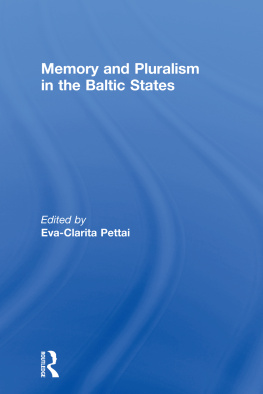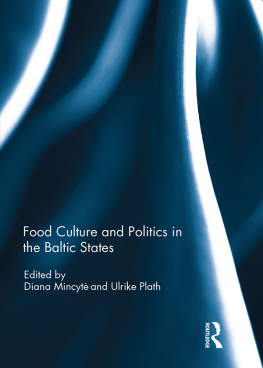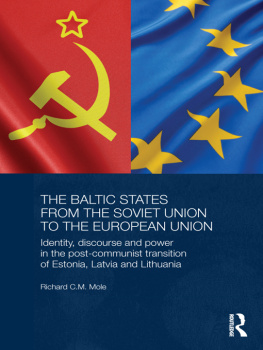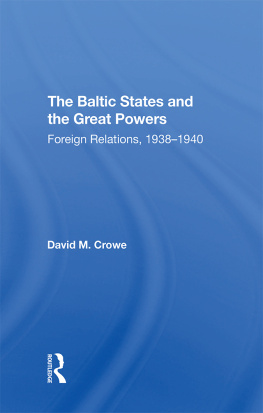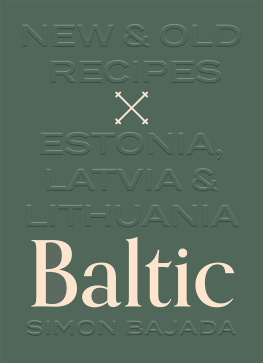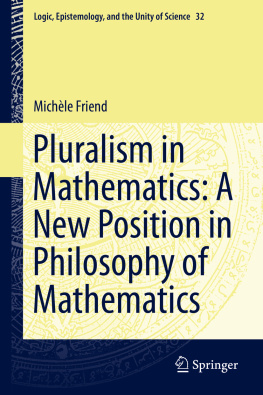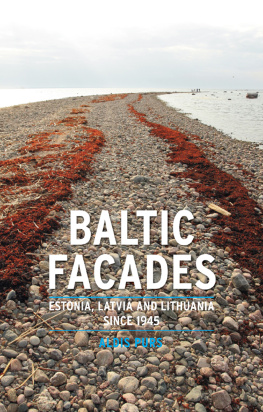Memory and Pluralism in the Baltic States
Memories, both in individual and collective form, still have a significant impact on how people relate to political processes in Europe today. While much has been written about top-down attempts by states and political actors to mould people's memories of the past through public commemoration, textbooks or monuments, this volume takes a view from below by focusing on different types of societal actors and the ways in which they interact with the political world in order to influence collective memory. Presented within a comprehensive conceptual framework, the empirical cases focus on three countries of the former Soviet Union: Estonia, Latvia and Lithuania. They show that different or even antagonistic perceptions of the recent past not only appear between different ethnic groups, but also between socio-economic groups, different age groups or generations as well as between women and men. Moreover, they give an impressive account on the multiple ways in which these perceptions empower individuals and groups to seek greater influence in the construction of collective memory.
The volume, therefore, not only provides a valuable and fresh perspective on the relationship between social memory and democratic politics, but also contributes to post-Communist regional studies in the enlarged European Union.
This book was published as a special issue of the Journal of Baltic Studies .
Eva-Clarita Pettai , PhD is Senior Researcher at the Institute of Government and Politics, University of Tartu, Estonia. She is author of two books on the uses of history and democratization in Latvia (both in German) as well as of numerous publications on WWII commemoration in Europe today from a cross-national comparative perspective.
Memory and Pluralism in the Baltic States
Edited by
Eva-Clarita Pettai
First published 2011
by Routledge
2 Park Square, Milton Park, Abingdon, Oxon, OX14 4RN
Simultaneously published in the USA and Canada
by Routledge
711 Third Avenue, New York, NY 10017
Routledge is an imprint of the Taylor & Francis Group, an informa business
2011 The Association for the Advancement of Baltic Studies
This book is a reproduction of the Journal of Baltic Studies , vol. 41, issue 3. The Publisher requests to those authors who may be citing this book to state, also, the bibliographical details of the special issue on which the book was based.
All rights reserved. No part of this book may be reprinted or reproduced or utilised in any form or by any electronic, mechanical, or other means, now known or hereafter invented, including photocopying and recording, or in any information storage or retrieval system, without permission in writing from the publishers.
Trademark notice : Product or corporate names may be trademarks or registered trademarks, and are used only for identification and explanation without intent to infringe.
British Library Cataloguing in Publication Data
A catalogue record for this book is available from the British Library
ISBN13: 978-0-415-66841-5
Typeset in Times New Roman
by Taylor & Francis Books
Disclaimer
The publisher would like to make readers aware that the chapters in this book are referred to as article as they had been in the special issue. The publisher accepts responsibility for any inconsistencies that may have arisen in the course of preparing this volume for print.
Contents
| Eva-Clarita Pettai |
| Neringa Klumbyt |
| Maria Golubeva |
| Dovil Budryt |
| Meike Wulf and Pertti Grnholm |
| Ieva Zake |
| Siobhan Kattago |
Dovil Budryt, PhD, is Associate Professor of Political Science at Georgia Gwinnett College, USA. Her publications include articles on democratization and two books, Taming Nationalism? Political Community Building in the PostSoviet Baltic States (Ashgate, 2005) and Feminist Conversations: Women, Trauma and Empowerment in Post-Transitional Societies (with L.M. Vaughn and N.T. Riegg, University of America Press, 2009).
Maria GoJubeva , PhD, is Senior Researcher at the Centre for Public Policy PROVIDUS in Riga, Latvia. She obtained her PhD in history from the University of Cambridge (UK) in 1999. Her academic research interests include social and political exclusion in elite discourses, and models of political competence from early modern to postmodern societies.
Pertti Grnholm , PhD, is Researcher and Docent ol General History at the School of History, Culture and Arts, University of Turku, Finland. He obtained his PhD at Turku in 2001, with a thesis on narratives and political uses of historical knowledge in Soviet Estonian historiography. He is currently working on a research project about nationalist history culture and political uses of history in Estonia (1918-1940 and 1991-present). His main research interests include historical culture, history politics and historiography in the twentieth-century Baltic Sea region and Soviet Union/Russia.
Siobhan Kattago , PhD, is Associate Professor of Political Philosophy at Tallinn University. She is author of Ambiguous Memory: the Nazi Past and German National Identity (Praeger, 2001). Her research interests focus on political and social theory, collective memory and historical consciousness, modernity and post-communist societies.
Neringa Klumbyt , PhD, is an assistant professor of anthropology at Miami University, Ohio, USA. Her research includes political and economic anthropology, anthropology of Europe and the European Union. She has published on issues of identity and politics, memory, consumption and food, morality and citizenship, as well as nationalism and integration into the EU.
Eva-Clarita Pettai , PhD, is Senior Researcher at the Institute of Government and Politics, University of Tartu, Estonia. She is the author of Democratizing History in Latvia (Krmer, 2003, in German) as well as of numerous publications on history and memory politics in the Baltic states. Her research interests include theories of history and collective memory, Baltic historiography as well as memory politics in Europe after the enlargement.
Meike Wulf , PhD, is Assistant Professor at the University of Maastricht, where she teaches Contemporary History, Area Studies and Politics. As postdoctoral research fellow at the Centre of East European Language Based Area Studies (CEELBAS UCL), she coordinated activities on cities and urban experiences in Eastern Europe. She is author of 'Historical Culture, Conflicting Memories and Identities in Post-Soviet Estonia' (forthcoming in Berghahn Books). Her research interests include the legacy of World War II in European commemorative cultures, cities in Eastern Europe, identity politics, political generations and life story research.
leva Zake , PhD is Associate Professor of Sociology at Rowan University, USA. Her research focuses on issues of ethnicity in American political system, ethnic anti-Communism, intellectuals and post-Communist societies. Her most recent book, American Latvians: Politics of a Refugee Community was published by Transaction Publishers in 2010.
Eva-Clarita Pettai
Memory and how it interacts with democratic politics remains a thriving theme within both academic and public debate.
The contributions to this volume examine the divergent social memories that exist in Baltic societies today. Coming from various disciplines and methodological backgrounds, the five empirical cases encompass an exploration of nostalgic memories of the Soviet period carried by rural and urban residents of Lithuania (Neringa Klumbyt); a critical analysis of a recent survey among teachers and students in majority and minority schools in both Latvia and Estonia with a focus on the teaching and reception of the countries' history (Maria Golubeva); a study of memory and political empowerment among Lithuanian female politicians who have experienced deportation (Dovil Budryt); a discussion of professional self-perceptions and political attitudes among Estonian historians of different generations (Pertti Grnholm and Meike Wulf); and finally, an exploration of public debates among intellectuals and politicians in Latvia over lustration policies (leva Zake). In a concluding theoretical and philosophical article Siobhan Kattago reflects on possible ways of reconciling the multiple, at times contrasting, memories and actors that exist in the Baltic societies today with the ideas of democratic pluralism.


